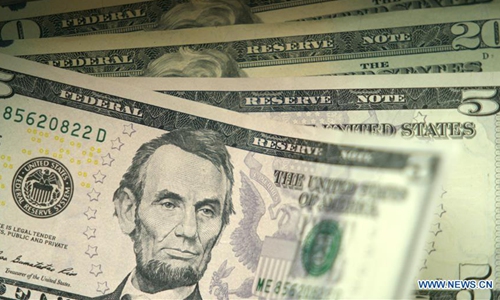
Photo taken on March 3, 2020 shows US dollar banknotes in Washington D.C., the United States.(Xinhua/Liu Jie)
China trimmed its holdings of US Treasury bonds for fourth consecutive month in June to reach its lowest level since October 2020, in what analysts call a move to prevent potential adverse impact from escalating China-US tensions.
According to data from the US Treasury Department on Monday, China's holdings of US Treasuries dropped to $1.062 trillion in June, down $16.5 billion from the previous month.
In the first half of the year, China sold US Treasuries between March and June after bought the bonds in January and February, with total holdings down $10.4 billion.
China remains the second-largest non-US holder of the Treasuries after Japan, which holds $1.277 trillion at the end of June.
The fluctuation of China's holdings of US Treasuries is a result of the country's central bank's flexible actions based on balance of payments, and for the purpose of stabilizing the yuan's foreign exchange rate, Xi Junyang, a professor at the Shanghai University of Finance and Economics, told the Global Times on Tuesday, adding that China may continue to sell US debt amid volatile China-US ties.
"There are political risks that the US dollar may be weaponized if the Biden administration continues the confrontational approach of his predecessor Donald Trump amid the strained China-US relationship. Given the volatilities on the market, excessive holding of US debt may pose financial security risks," he said.
In addition, economic exchanges between China and other economies like the EU and ASEAN are on the rise, resulting in growing need for the central bank to increase holding of other currencies, analysts noted.
However, some market analysts said that China may continue to buy US Treasury bonds given there are few other better options for China to invest its vast foreign exchange reserve assets.
According to latest data released by the State Administration of Foreign Exchange, China's total foreign exchange reserves reached $3.24 trillion in July, a record high since 2016.
Global Times




